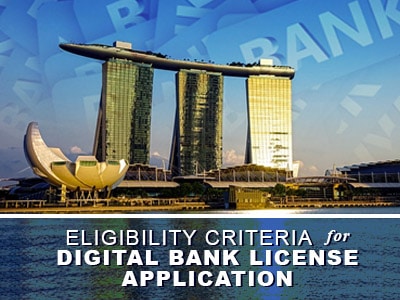Monetary Authority of Singapore (MAS) Outlines Eligibility Criteria For Digital Bank License Application
 The Monetary Authority of Singapore (MAS) announced that the application for new digital bank licenses from non-bank players is now opened. The regulator is expected to award up to five digital bank licences by mid-2020 and the successful applicants are expected to start operations by mid-2021. The five new licences consist of two digital full bank licences and three digital wholesale bank licences.
The Monetary Authority of Singapore (MAS) announced that the application for new digital bank licenses from non-bank players is now opened. The regulator is expected to award up to five digital bank licences by mid-2020 and the successful applicants are expected to start operations by mid-2021. The five new licences consist of two digital full bank licences and three digital wholesale bank licences.
MAS’s digital bank licensing framework outlined a set of application requirements that list the eligibility criteria that applicants have to meet to be awarded the digital bank licence. According to the digital bank licensing framework, the digital banking entity has to be incorporated in Singapore, and is subject to the same anti-money laundering requirements as traditional banks.
About Digital Full Bank Licence
Digital full bank licence, as the name implies, will allow licensees to provide a slew of financial services and take deposits from retail customers. On the other hand, digital wholesale bank licences will enable licensees to serve small and medium-sized enterprises (SMEs) and other non-retail segments. While digital wholesale bank licences are open to all companies, companies wish to apply for digital full bank licence must be anchored in Singapore, headquartered in Singapore, and controlled by Singaporeans. The eligibility requirement also states that a foreign company must form a joint venture with a Singapore company (in which the joint venture must fulfil the headquarter and control requirements) if the foreign company is interested to apply for a digital full bank licence.
A digital full bank will start its operations in a restricted phase for one to two years, with a minimum paid-up capital of S$15 million. According to MAS, the restricted phase is mandatory to minimise and mitigate the risk of untested business models. It will be subject to a deposit-taking cap of S$50 million in total, with the deposit per individual cap of S$75,000. Further to this, after two years of operations, a restricted digital bank (which takes retail deposits and that fulfils MAS’s requirements) could be free from the initial S$50-million deposit cap progressively, and progress to operate as a full functioning digital bank gradually. Under tight regulations, the restricted bank is only allowed to accept deposits from a small group of persons (e.g. business partners, staff, and related parties) and it can only provide simple credit and investment products to retail customers at the initial stage. Furthermore, it has to participate in the deposit insurance scheme (to safeguard deposits of up to S$75,000 per depositor in the event of the bank’s failure) and be restricted in banking operations to no more than two overseas markets. Though digital full banks can take in deposits, they cannot access the existing ATM networks of banks.
Digital Bank License Application Criteria for Digital Wholesale Banks
Meanwhile, digital wholesale banks which can take deposits from SMEs and other non-retail segments, will start operating with the minimum paid-up capital of S$100 million. Although digital wholesale banks cannot take Singdollar deposits from individuals (except fixed deposits of at least S$250,000), they can open and maintain business deposit accounts for SMEs and corporates. Applicants must substantiate their applications with a proven track record of their contributions to Singapore’s financial centre (such as employment opportunities), as well as a five-year financial projection of the proposed digital bank. The assumption of the financial projection has to be reviewed by an external and independent expert. In other words, any digital banking applicant will not be qualified for the digital bank licence if it demonstrates a consistent or increasing loss-making trend.
MAS had explained that although the formal requirement of a path to profitability will not bar any interested party from applying for the digital bank licence, applicants must be able to show a “clear value proposition” to meet underserved needs (i.e. young millennials, SMEs and start-ups) with technology. One of the requirements stipulates that a minimum of one entity (which holds a 20% stake) in a consortium have to hold at least three-year track record in operating an existing technology or e-commerce business. In the bid to mitigate unsustainable banking practices, MAS will monitor market dynamics and impose additional supervisory requirements or restrictions, if needed.
The announcement of issuance of digital bank licences marks another milestone in Singapore’s banking liberalisation journey and signals a shake-up of Singapore’s banking sector for the first time in two decades. The move would disrupt the traditional banking industry when technology players and non-banking firms come on board to challenge traditional bankers.








